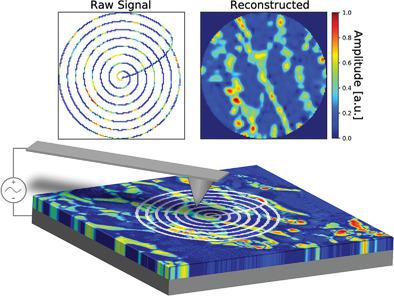Our official English website, www.x-mol.net, welcomes your
feedback! (Note: you will need to create a separate account there.)
Fast Scanning Probe Microscopy via Machine Learning: Non-Rectangular Scans with Compressed Sensing and Gaussian Process Optimization.
Small ( IF 13.0 ) Pub Date : 2020-08-11 , DOI: 10.1002/smll.202002878 Kyle P Kelley 1 , Maxim Ziatdinov 1 , Liam Collins 1 , Michael A Susner 2 , Rama K Vasudevan 1 , Nina Balke 1 , Sergei V Kalinin 1 , Stephen Jesse 1
Small ( IF 13.0 ) Pub Date : 2020-08-11 , DOI: 10.1002/smll.202002878 Kyle P Kelley 1 , Maxim Ziatdinov 1 , Liam Collins 1 , Michael A Susner 2 , Rama K Vasudevan 1 , Nina Balke 1 , Sergei V Kalinin 1 , Stephen Jesse 1
Affiliation

|
Fast scanning probe microscopy enabled via machine learning allows for a broad range of nanoscale, temporally resolved physics to be uncovered. However, such examples for functional imaging are few in number. Here, using piezoresponse force microscopy (PFM) as a model application, a factor of 5.8 reduction in data collection using a combination of sparse spiral scanning with compressive sensing and Gaussian process regression reconstruction is demonstrated. It is found that even extremely sparse spiral scans offer strong reconstructions with less than 6% error for Gaussian process regression reconstructions. Further, the error associated with each reconstructive technique per reconstruction iteration is analyzed, finding the error is similar past ≈15 iterations, while at initial iterations Gaussian process regression outperforms compressive sensing. This study highlights the capabilities of reconstruction techniques when applied to sparse data, particularly sparse spiral PFM scans, with broad applications in scanning probe and electron microscopies.
中文翻译:

通过机器学习的快速扫描探针显微镜:具有压缩感测和高斯过程优化的非矩形扫描。
通过机器学习实现的快速扫描探针显微镜技术可以发现范围广泛的纳米级时间分辨物理学。但是,用于功能成像的此类示例数量很少。在这里,使用压电响应力显微镜(PFM)作为模型应用,使用稀疏螺旋扫描与压缩感测和高斯过程回归重建相结合,证明了数据收集减少了5.8倍。发现即使是极稀疏的螺旋扫描也能提供高强度的重建,而高斯过程回归重建的误差小于6%。此外,分析了每次重建迭代中与每种重建技术相关的误差,发现该误差在≈15次迭代后仍相似,而在初始迭代中,高斯过程回归的性能优于压缩感知。这项研究强调了重建技术在应用于稀疏数据(尤其是稀疏螺旋PFM扫描)时的功能,在扫描探针和电子显微镜中具有广泛的应用。
更新日期:2020-09-18
中文翻译:

通过机器学习的快速扫描探针显微镜:具有压缩感测和高斯过程优化的非矩形扫描。
通过机器学习实现的快速扫描探针显微镜技术可以发现范围广泛的纳米级时间分辨物理学。但是,用于功能成像的此类示例数量很少。在这里,使用压电响应力显微镜(PFM)作为模型应用,使用稀疏螺旋扫描与压缩感测和高斯过程回归重建相结合,证明了数据收集减少了5.8倍。发现即使是极稀疏的螺旋扫描也能提供高强度的重建,而高斯过程回归重建的误差小于6%。此外,分析了每次重建迭代中与每种重建技术相关的误差,发现该误差在≈15次迭代后仍相似,而在初始迭代中,高斯过程回归的性能优于压缩感知。这项研究强调了重建技术在应用于稀疏数据(尤其是稀疏螺旋PFM扫描)时的功能,在扫描探针和电子显微镜中具有广泛的应用。










































 京公网安备 11010802027423号
京公网安备 11010802027423号